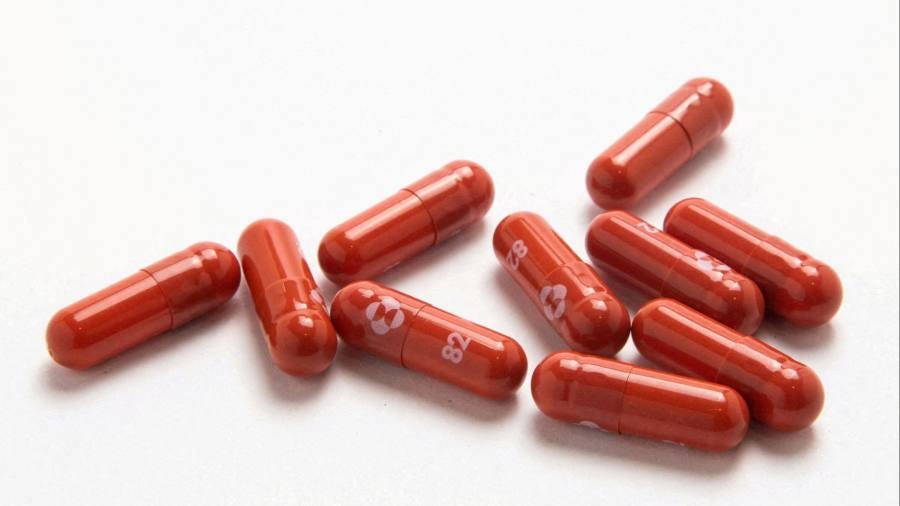This is a republication of the article “Merck antiviral trial shows promising impact on Covid recovery time”, with the title above.
Institute for Health Transformation (IHT)
Joaquim Cardoso MSc
Founder and Chief Researcher & Editor
December 23, 2022
Source:
Financial Times
December 22, 2022
Molnupiravir, the antiviral pill developed by Merck to treat Covid-19, speeded up patients’ recovery but failed to reduce risks of hospitalisation and death, full results of an extensive UK clinical trial showed.
A peer-reviewed paper published in The Lancet confirmed preliminary findings released in October that molnupiravir — marketed by the US pharmaceutical group as Lagevrio — did not prevent the most severe disease among the 25,700 participants.
But researchers at Oxford university, who led the so-called Panoramic trial, put more emphasis on the positive secondary outcomes at a media briefing on Thursday.
“The trial suggests that this treatment could have other benefits when being used to treat Covid, such as a faster recovery time and reduced follow-up with health services,” said Oxford’s Chris Butler, joint chief investigator.
On average molnupiravir cut the duration of symptoms by about four days.
On average molnupiravir cut the duration of symptoms by about four days.
“This could help ease the burden on UK health services through the treatment of selected patients at home during times of high disease burden and pressure on key services,” he said.
Former deputy chief medical officer Sir Jonathan Van-Tam of Nottingham university, another member of the study team, commented:
“While molnupiravir was originally found to work well to reduce hospitalisation in patients with Covid, these were unvaccinated patients.
This latest research has repeated the exercise in the highly vaccinated population, demonstrating that the vaccine protection is so strong that there is no obvious benefit from the drug in terms of further reducing hospitalisation and deaths.
However, symptom duration and virus shedding are both markedly reduced.”
“While molnupiravir was originally found to work well to reduce hospitalisation in patients with Covid, these were unvaccinated patients.
This latest research has repeated the exercise in the highly vaccinated population, demonstrating that the vaccine protection is so strong that there is no obvious benefit from the drug in terms of further reducing hospitalisation and deaths.
However, symptom duration and virus shedding are both markedly reduced.”

Molnupiravir works by inducing an overload of lethal mutations in Sars-Cov-2, the virus that causes Covid.
Some scientists had expressed fears that this “error catastrophe” might accelerate the evolution of harmful variants, but Judith Breuer of University College London, who led a section of the Panoramic trial dealing with the virology of Covid, said this concern now seemed unjustified.
“Any virus persisting after treatment is too highly mutated to be viable,” she said.
The researchers plan next to evaluate the costs and benefits of molnupiravir treatment and the drug’s effect on long-term Covid symptoms.
But, at a cost of several hundred pounds per patient, its prescription by family doctors as a Covid treatment for the general population could not be justified, said Paul Little of Southampton university, co-chief investigator.
But, at a cost of several hundred pounds per patient, its prescription by family doctors as a Covid treatment for the general population could not be justified, …
“We are encouraged by these findings from Panoramic,” said Merck, which is known as MSD outside North America.
“These results, particularly with regard to symptomatic improvement . . . further support the urgent need for global access to Lagevrio for the treatment of Covid-19 in appropriate high-risk patients.”
Presenting its third-quarter results at the end of October, Merck said it expected to sell between $5.2bn and $5.4bn of Lagevrio in 2022, although sales are now falling fast — from $3.24bn in the first quarter to $1.18bn in the second and $436mn in the third.
Originally published at https://www.ft.com on December 22, 2022.
Names mentioned
Oxford’s Chris Butler, joint chief investigator.
Merck, Molnupiravir
Judith Breuer of University College London,
Paul Little of Southampton university, co-chief investigator.

Prof Christopher C Butler, FMedSci *
Prof F D Richard Hobbs, FMedSci *
Prof Jonathan S Nguyen-Van-Tam, FMedSci












